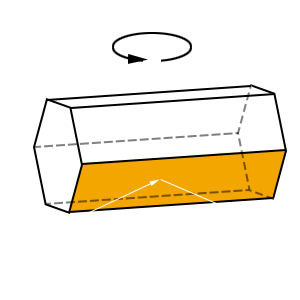The solar arc forms a loop over the sun. At a sun height of 10°, the vertex extends beyond the zenith. As the sun's height increases, the loop contracts more and more. When the sun reaches a height of 30°, the vertex is just above the
circumzenithal arc. Simultaneously, the two ends of the arc below the sun swing further and further out to the east and west. At a sun height of 50°, the loop over the sun becomes so small that the vertex is below the
Parry arc. The two ends meet at about 65° opposite the sun on the horizon.
There have been only a few observations of this halo from Central Europe so far. Its rarity has various reasons. First, double-oriented column crystals must be present in large numbers, which is rarely the case. Additionally, the arc is very faint and white. Therefore, it only stands out with difficulty from the sky background. Good conditions prevail when the sky is covered with thin, barely visible cirrostratus. If a well-developed Parry arc is visible, the solar arc can also be expected.
The sunbow mainly arises from the reflection of sunlight on the two prism surfaces located at the lower side of the crystal. The formation is comparable to the
horizontal circle, except that here the crystal surfaces are not vertical but are at an angle of 60° to the horizontal. In addition to reflection on the outer surface, internal reflection also contributes to this halo. The refraction of light at entry and exit cancels out, so there is no color dispersion.

